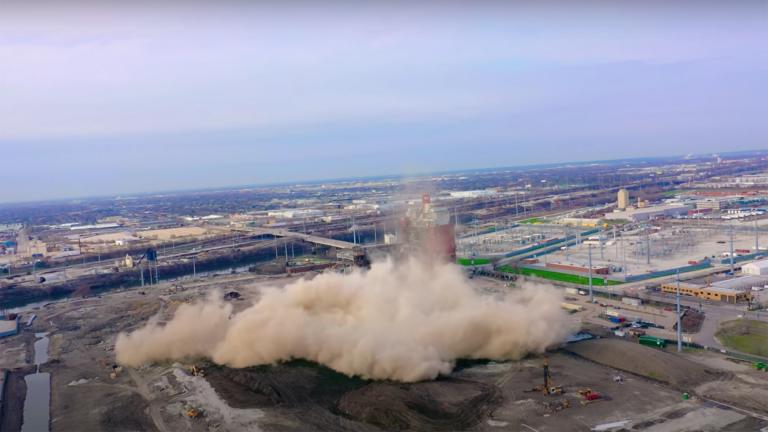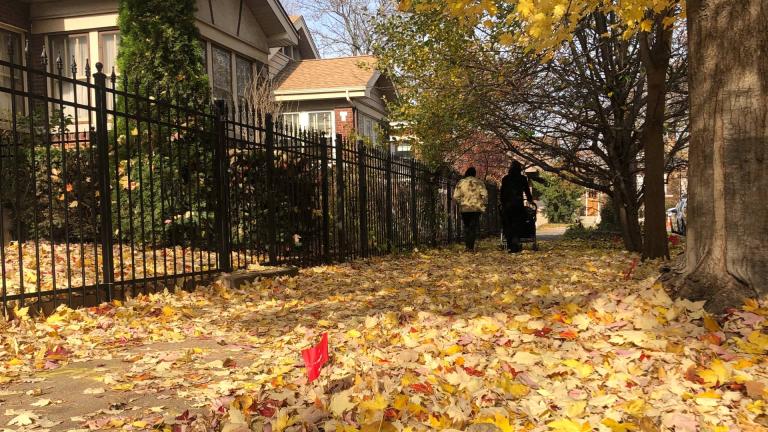Little Village residents have filed a pair of lawsuits against Hilco Redevelopment Partners and other parties involved in the mishandled demolition of a former smokestack, which left the neighborhood covered in a plume of unknown particles over the Easter weekend.
Though filed separately on behalf of different plaintiffs in different jurisdictions — U.S. District Court and Cook County Circuit Court — the suits both allege disregard for the community’s safety and failure to properly contain fallout from the implosion conducted April 11 on the site of the former Crawford Coal Plant.
The suit brought against Hilco and others by Loevy & Loevy on behalf of plaintiffs Antonio Solis, Jose Solis and Juan Rangel states that the closure of the Crawford Coal Plant, opened in 1924 and finally decommissioned in 2012, “was supposed to represent the end of a major and deadly source of pollution in the neighborhood. Instead, the Defendants’ actions have caused the very chemicals from the Crawford Coal Plant that … the Little Village community worried about for years to blanket residents, homes, businesses, and open spaces.”
A second suit, brought by Clifford Law Offices on behalf of plaintiff Katherine Ramirez-Mercado states that the “Defendant further chose to proceed with the implosion, despite knowing the risk of releasing noxious particulate matter into the neighborhood, all while in the face of an executive order issued by federal, state and local government, ordering residents to stay in their homes. Little Village residents, including Plaintiff, had no way to escape Defendants’ careless acts and omissions.”
Hilco has issued an apology and outlined corrective actions, and the city has launched an investigation into what went wrong with the implosion, a form of demolition rarely conducted in Chicago.
But during a virtual press conference held Thursday, environmental activists asserted that what happened in Little Village was no isolated incident but rather a demonstration of the perpetuation of systemic “environmental racism” against black and brown communities in Chicago.
“This isn’t a ‘bad apple’ problem. This is not about a botched plan or a permit problem. The Crawford implosion exposes that Chicago’s urban development system serves corporate interests at the expense of black and brown communities,” said Kim Wasserman, executive director of the Little Village Environmental Justice Organization (LVEJO).
Olga Bautista, board member with the Southeast Environmental Task Force, concurred.
Vulnerable Chicago residents are routinely exposed to toxins, whether it’s dust from pet coke, “fluff” from metal scrappers, fumes from asphalt plants or diesel emissions at trucking hubs, Bautista said.
“Every single time, the onus has been put on community members to catch these players and their bad acts, and every single time we have to fight like hell to convince the city and CDPH (Chicago Department of Public Health) to take action,” she said. “What is absolutely unconscionable is that there are still other plans in motion in other parts of the city that haven’t been halted, even though we are in the middle of a pandemic.”
“I am tired of the city of Chicago being the concierge to polluters,” said an emotional Bautista.
In addition to calling for the city to immediately put an end to the existing operations of Hilco, General Iron scrapping and Mat Asphalt, among others, activists are demanding reform of the industrial land use permitting and zoning processes, with public health and community decision-making placed at the forefront.
The community should have the first right of refusal when it comes to developments in industrial corridors, said Wasserman, who was then asked whether any industry would ever be welcomed by residents.
Yes, she responded.
“There are industry players who are concerned about reducing harm … who care about being a good neighbor,” Wasserman said.
Ald. Byron Sigcho-Lopez (25th) and Ald. Rossana Rodriguez Sanchez (33rd) both participated in the virtual press conference and indicated their support for crafting an ordinance that would increase transparency and give constituents a greater voice, though no specifics were presented.
Closed-door meetings and expedited permits should be red flags, said Sigcho-Lopez.
“This is about having a process of accountability … so this never happens again,” he said.
Contact Patty Wetli: @pattywetli | (773) 509-5623 | [email protected]





